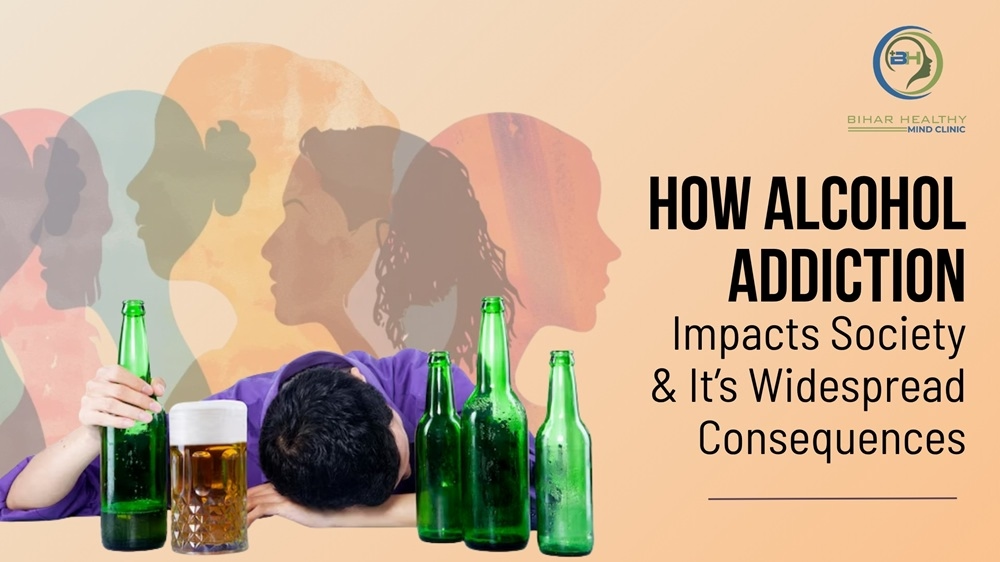
Alcohol addiction, also known as Alcohol Use Disorder (AUD), continues to be one of the most prevalent and overlooked public health issues globally. In India, alcohol addiction extends beyond the individual, creating a complicated network of emotional, social, financial, and mental health challenges that affect all areas of society.
At Patna Psychiatry, under the guidance of Dr. Saurabh Kumar, MD (Psychiatry), widely recognized as the Best Psychiatrist in Patna, comprehensive treatment and awareness-building for alcohol addiction are key pillars of care. This blog explores how alcohol addiction impacts society, analyzing it through the lens of psychiatric understanding while emphasizing the urgent need for early intervention.
Understanding Alcohol Addiction
Before diving into the societal effects, it’s essential to understand what alcohol addiction entails. Alcohol Use Disorder is a long-term health condition marked by a persistent inability to limit alcohol consumption, even when it leads to negative effects on health, work, or social life. It ranges from mild to severe and often coexists with mental health disorders like depression, anxiety, and PTSD.
While the personal and health effects are significant, the broader social consequences of alcohol are equally distressing.
What Is the Impact of Alcohol on Society?
The impact of alcohol addiction on society is multifaceted, influencing various sectors such as:
Family and Interpersonal Relationships
One of the most immediate and emotionally draining effects of alcohol addiction is on the family unit. Alcohol-dependent individuals often exhibit mood swings, irritability, and aggression, creating an environment of fear, neglect, and dysfunction at home. Children in such families may experience long-term trauma, academic decline, or develop behavioral issues.
Spouses and partners may endure emotional abuse, financial strain, or even domestic violence, all of which break down trust and communication within the family system.
Workplace Disruptions
Alcohol misuse leads to decreased productivity, frequent absenteeism, and higher accident rates in the workplace. Organizations suffer from poor performance, increased healthcare costs, and strained co-worker relationships due to the unpredictability and unreliability of employees grappling with addiction.
Public Safety and Crime
From road traffic accidents caused by drunk driving to alcohol-related assaults and property crimes, public safety is another area where the impact of alcohol becomes starkly visible. Law enforcement and healthcare systems are routinely burdened by alcohol-induced emergencies.
In many cases, criminal behavior is directly linked to impaired judgment and disinhibition brought on by alcohol consumption.
The Psychological and Social Consequences of Alcohol
A psychiatrist often sees how deeply alcohol addiction affects not just the brain but also the broader social fabric. Let’s delve deeper into these social consequences of alcohol:
Stigmatization and Isolation
People with alcohol dependency often face severe stigma, which isolates them from their community, friends, and even family members. This social withdrawal worsens mental health, creating a vicious cycle of shame and increased alcohol use as a coping mechanism.
Generational Impact
Children raised in homes with alcohol abuse may grow up with unresolved trauma or model similar addictive behaviors. This creates a generational chain of mental health challenges, substance abuse, and relationship dysfunctions.
Healthcare Burden
Alcohol addiction leads to numerous health complications such as liver cirrhosis, pancreatitis, heart disease, cognitive decline, and psychiatric disorders. The burden on India’s already stretched healthcare system becomes enormous when such cases go untreated or untreated for too long.
How a Psychiatric Approach Helps in Treatment and Recovery
At Patna Psychiatry, Dr. Saurabh Kumar, the Best Psychiatrist in Patna, adopts a holistic approach to treating alcohol addiction. The recovery process focuses not only on detoxification but also on rebuilding relationships, treating underlying mental health issues, and re-integrating individuals into society.
Effective treatment strategies include:
- Cognitive Behavioral Therapy (CBT) to change thought patterns.
- Family therapy to mend broken relationships.
- Medication-assisted therapy (MAT) when clinically appropriate.
- Relapse prevention training and community support.
Community Costs and Economic Burden of Alcohol Addiction
Another often overlooked aspect when examining how alcohol addiction impacts society is its long-term economic toll. The financial costs associated with alcohol misuse are massive, both for the individual and for society at large.
On a personal level, people suffering from alcohol dependence may face job loss, reduced income, and increased expenses due to medical treatment, legal issues, or property damage. Families may experience poverty, educational disruption, and lack of access to quality healthcare, all triggered by an addiction in the household.
On a macro scale, the government and public health systems bear the burden of increased hospital admissions, emergency room visits, and long-term disability cases. According to various studies, a significant portion of India’s healthcare spending is indirectly linked to alcohol-related diseases and injuries.
Moreover, alcohol-related absenteeism, early retirements, and workforce inefficiencies lower national productivity, resulting in GDP losses that impact the economy at every level. Law enforcement, judicial systems, and social welfare programs are also strained under the weight of alcohol-related offenses and neglect cases.
By understanding and addressing the social consequences of alcohol through policy reform and psychiatric support, society can begin to reverse these damages and move toward a healthier, more resilient future.
Final Thoughts: A Shared Responsibility
Understanding how alcohol addiction impacts society is not just a clinical concern, it’s a social imperative. The ripple effects are visible in families, workplaces, hospitals, and public spaces. Combating this issue requires awareness, empathy, and timely psychiatric support.
If you or a loved one is experiencing the consequences of alcohol dependence, help is available. Connect with Patna Psychiatry, where Dr. Saurabh Kumar provides personalized, research-backed treatment with a focus on empathetic and effective care.
Disclaimer: All characters and events depicted in this blog are entirely fictional. Any resemblance to actual persons, living or dead, is purely coincidental. The content is intended for informational purposes only and should not be considered as medical advice. Always consult a qualified healthcare professional for medical concerns.
Visitors: 126





No comments yet.